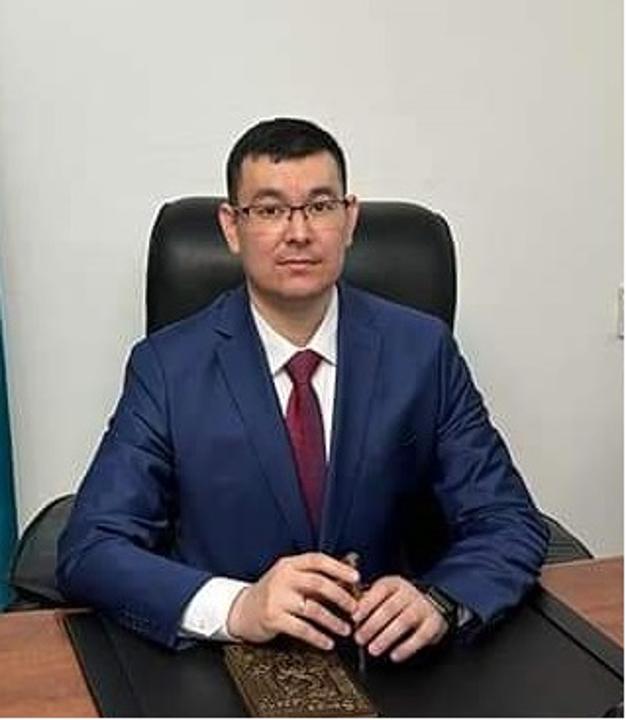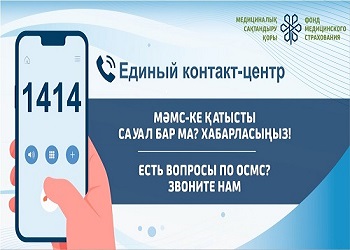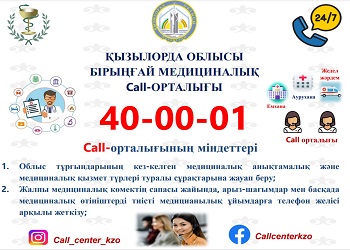CLINICAL DIAGNOSTIC LABORATORY
Dautbaeva Altynay Kenesovna
Head of Department
First category doctor
The clinical diagnostic laboratory of the multidisciplinary regional hospital today is one of the largest laboratories in Kyzylorda. The laboratory, offering patients more than 206 types of laboratory studies, provides fast, reliable and reliable results in all areas of clinical laboratory studies that help to give the patient the correct diagnosis, choose the desired treatment method, determine the prognosis of the disease, monitor the effectiveness of therapy, and develop adequate preventive measures.
Each year, the laboratory staff performs in a planned and emergency order about a half million studies.
The laboratory staff has extensive experience in medical institutions, all have a certificate of specialist and qualification category.
In addition to patient care, the laboratory can work with public, private medical institutions and individual clients.
To provide services to individuals, a special reception and advisory department for customer services has been organized. There is a treatment room for taking blood.
The laboratory is equipped with the most advanced production equipment of the world leaders in the field of laboratory equipment and analytical technologies, and an individual coding system has been introduced.
The laboratory is developing intensively, for 3 years a lot of new modern methods have been introduced:
• assessment of the state of the most important organs and systems (liver, kidneys, heart, lungs) of the balance state of lipid, carbohydrate, pigment and mineral exchanges.
• identification of a wide range of hormones for the diagnosis and monitoring of diabetes mellitus, thyroid and pancreas, reasonable
treatment of sexual disorders and other endocrine diseases.
• diagnosis of myocardial infarction, disorders in the blood coagulation system, autoimmune conditions, anemia,
• research oncologic markers that allow to detect tumors in various organs at the earliest stages of development (lactic, prostate, gastrointestinal tract, etc.)
• identification of fetal pathology
• infections: chlamydia, mycoplasmosis, ureaplasmosis, toxoplasmosis, gardnerellosis, tuberculosis, trichomoniasis, candidiasis, aspirillegiez, herpes, cytomegalovirus, helicobacter.
In our laboratory, you can undergo a comprehensive examination of the following profiles:
● Cardiac examinations - Cholesterol, triglycerides, ALT, AsAT, K / Na / CL, Prothrombin, Fibrinogen, C-reactive protein.
● Lipid spectrum - Cholesterol, Triglycerides.
● Primary examination of the liver - AlAT, AsAT, Total Bilirubin, Thymol Alkaline Phosphatase.
● Complete liver examination - ALAT, AsAT, Total Bilirubin, Straight Bilirubin, Thymol test, Alkaline phosphatase, Total blood protein, Protein fractions, Prothrombin.
● Primary screening for hepatitis — AlAT, AsAT, Hepatitis B — HBsAg, Hepatitis C — anti-HCV total.
● Examination of the kidneys - Creatinine, Blood Urea, Calcium, K / Na / CL, Magnesium, Inorganic Phosphorus, Urinalysis.
● Rheumatological profile - ASL-O, C-reactive protein, Rheumatoid factor, Total blood protein, Protein fractions, complete blood count, ESR, leukocyte formula.
● Diabetic profile - Glucose, glycated hemoglobin.
● Diagnosis of anemia - Complete blood count, Leukocyte blood count, reticulocyte count, Iron, Transferrin.
● Prenatal profile - hCG, AFP.
● Oncology profile
● Male: CEA, SA-19-9, common PSA, free PSA;
● Female: REA, СА-19-9, СА-15-3, СА-125.
● Diagnosis of osteoporosis - Calcium, phosphorus, urine creatinine, uric acid.
● Diagnosis of the prostate gland - common PSA, free PSA.
● Thyroid gland primary examination - TSH, AT-TPO.
● Thyroid gland detailed examination - T3 free, T4free, TSH, AT-TPO, AT-TG.
● Hospitalization in therapeutic departments - HIV, Syphilis, Hepatitis B - HBsAg, Hepatitis C anti-HCV total, Complete blood count,
● Leukocyte formula, ESR, AlAT, AsAT, Alkaline phosphatase, Glucose, Blood creatinine, Blood Urea, Total blood protein,
● Protein fractions, total bilirubin, direct bilirubin, K / Na / CL, urinalysis.
● Rhesus affiliation, urinalysis.
Research performed by the clinical diagnostic laboratory:
• Blood test
1. Determination of blood hemoglobin
2. Determination of plasma free hemoglobin
3. Counting the number of red blood cells
4. Determination of erythrocyte lifespan
5. Determination of sickle cell red blood cells.
6. Determination of hematocrit value (index)
7. Estimated figures: the calculation of the average concentration of hemoglobin in the erythrocyte, the calculation of the average volume of the erythrocyte
8. Change in red blood cell diameter in a stained smear.
9. Determination of osmotic resistance of erythrocytes
10. Red blood cell counting with basophilic granularity
11. Counting reticulocytes
12. Platelet count
13. Determination of erythrocyte sedimentation rate (ESR)
14. Counting leukocyte formula describing the morphology of blood cells
15. Counting myelokaryocytes
16. Myelogram counting and characteristics of bone marrow hematopoiesis
17. Counting of siderocytes and sederoblasts (in peripheral blood smears, in bone marrow smears)
18. Detection of lupus erythematosus cells (LE-CELL)
19. Blood test for malaria parasites
• Urine analysis
1. Determination of the quantity, color, transparency, the presence of sediment.
2. Determination of relative density
3. Determination of pH
4. Glucose Detection
5. Determination of glucose
6. Protein Detection
7. Determination of protein
8. Ben-Jones squirrel detection
9. Detection of ketone bodies
10. Blood detection
11. Detection of bilirubin
12. Detection of urobilin bodies
13. Detection of hemosiderin
14. Microscopic examination of the sediment (on the epithelium, red blood cells, white blood cells, cylinders, etc.)
15. Counting the number of shaped elements using the Nechiporenko method
16. Determination of the concentration ability of the kidneys by the Zimnitsky method.
• Sputum Analysis
1. Determination of the quantity, color, nature, consistency, smell, division into layers
2. Microscopic examination (for elastic fibers, asthmatic elements, leukocytes, erythrocytes, epithelium, actinomycetes drusen, neoplasm cells, etc.)
3. Detection of hemosiderin
4. Detection of Mycobacterium Tuberculosis
• Analysis of feces
1. Determination of color, shape, odor, mucus, pH
2. Blood detection
3. Detection of urobilin bodies (stercobilin)
4. Bilirubin Detection
5. Protein Detection
6. Microscopic examination (food debris, mucus, red blood cells, epithelium, leukocytes, etc.)
7. Definition of the simplest
8. Helminth Egg Detection
• Analysis of urinary tract discharge
1. Detection of Trichomonas and gonococci
2. Determination of vaginal purity
3. Determination of the hormonal profile
4. Research on prostate secretion
5. Determination of quantity, color, odor, viscosity, pH of ejaculate
6. Microscopic examination of ejaculate
7. Determination of sperm motility in 1 ml of ejaculate
8. Definition of "live" and "dead" sperm
9. Stimulation of sperm motility ("revitalization")
Duodenal Content Analysis
10. Determination of color, quantity, transparency, relative density, pH
11. Microscopic examination (on leukocytes, epithelium, crystals, mucus, giardium)
• Analysis of cerebrospinal fluid
1. Determination of color, transparency, relative density, fibrinous film
2. Protein Detection
3. Determination of protein
4. Determination of the number of cellular elements (cytosis) and their differential counting
• Analysis of transudates and exudates
1. Definition of color, transparency, relative density
2. Protein Detection
3. Determination of protein
4. Microscopic examination (for erythrocytes, epithelium, cells of malignant neoplasms, etc.)
• Cytochemical analyzes
1. Determination of peroxidase activity in peripheral blood cells, in bone marrow cells
2. Reaction to siderocytes in peripheral blood cells, in bone marrow cells
• Analysis of direct and indirect immunofluorescence
1. on chlamydia
2. for cytomegalovirus
3. for herpes: HSV1, HSV2
4. ureaplasmosis
5. mycoplasmosis
6. Gardrenellosis
7. trichomoniasis
All studies are conducted using modern laboratory equipment (hematology analyzers, automated urine testing systems). All consumables have quality certificates and registration certificates.
The schedule of the laboratory from 8-00 to 17-00 hours except Saturday and Sunday. The results of most studies can be obtained on the day of delivery of the biomaterial - the time of the research: from 5 minutes to 2 hours.
Employees:
Edreshova G.E. - laboratory doctor of the first category
Ansatbayeva L - Laboratory Specialist
Torgautova A - Laboratory Specialist
Dautbaeva A.K. - Laboratory Specialist
Our contacts:
+7 (7242) 23-51-50
+7 (7242) 23-52-78
+7 (7242) 23-51-96
internal numbers 312, 362, 193, 169











